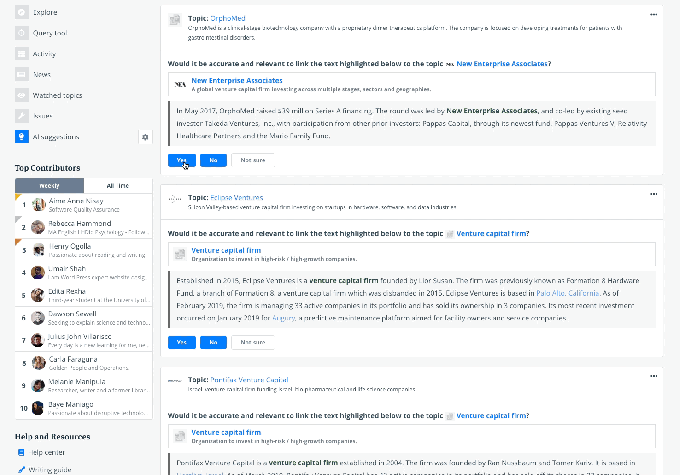Jude Gomila, who previously sold his mobile advertising company Heyzap to RNTS Media, is taking on a new challenge — building a “knowledge base” that can fill in Wikipedia’s blind spots, particularly when it comes to emerging technologies and startups.
While Gomila is officially launching Golden today, it’s already full of content about things like the latest batch of Y Combinator startups and morphogenetic engineering. And it’s already raised $5 million from Andreessen Horowitz, Gigafund, Founders Fund, SV Angel, Liquid 2 Ventures/Joe Montana, plus a long list of individual angel investors including Gomila’s Heyzap co-founder, Immad Akhund.
To state the obvious: Wikipedia is an incredibly useful website, but Gomila pointed out that notable companies and technologies like SV Angel, Benchling, Lisk and Urbit don’t currently have entries. Part of the problem is what he called Wikipedia’s “arbitrary notability threshold,” where pages are deleted for not being notable enough. (Full disclosure: This is also what happened years ago to the Wikipedia page about yours truly — which I swear I didn’t write myself.)
Perhaps that threshold made sense when Wikipedia was just getting started and the infrastructure costs were higher, but Gomila said it doesn’t make sense now. In determining what should be included in Golden, he said the “more fundamental” question is more about existence: “Does this company exist? Does Anthony Ha exist?” If so, there’s a good chance that it should have a page on Golden, at least eventually.
In his blog post outlining his vision for the site, Gomila wrote:
We live in an age of extreme niches, an age when validation and completeness is more important than notability. Our encyclopedia on Golden doesn’t have limited shelf space — we eventually want to map everything that exists. Special relativity was not notable to the general public the moment Einstein released his seminal paper, but certainly was later on — could this have been the kind of topic to be removed from the world’s canon if it was discovered today?

Gomila said he’s also bringing some new technologies and fresh approaches to the problem. Some of this is pretty straightforward, like allowing users to embed video, academic papers and other multimedia content onto Golden pages.
At the same time, he’s hoping to make it much easier to write and edit Golden pages. You do so in a WYSIWYG editor that doesn’t require you to know any HTML, and the site will help you with automated suggestions, for example pulling out author and title information when you’re adding a link to another site.
Gomila said that this will allow users to work much more quickly, so that “one hour spent on Golden is effectively 100 hours on other platforms.”
There’s also an emphasis on transparency, which includes features like “high resolution citations” (citations that make it extra clear which statement you’re trying to provide evidence for) and the fact that Golden account names are tied to your real identity — in other words, you’re supposed to edit pages under your own name. Gomila said the site backs this up with bot detection and “various protection mechanisms” designed to ensure that users aren’t pretending to be someone they’re not.
“I’m sure there will always be trolls up to their usual tricks, but they will be on the losing side,” he told me.

If you think someone has added incorrect or misleading information to a page, you can flag it as an issue. Gomila suggested AI could also play a more editorial role by pointing out when someone is using language that’s biased or seems too close to marketing-speak.
“AI can have bias and humans can have bias,” he acknowledged, but he’s hoping that both elements working together can help Golden get closer to the truth. He added that “rather than us editorially changing things, our team will act like normal users” who can edit and flag issues.
Golden is available to users for free, without advertising. Gomila said his initial plan for making money is charging investment funds and large companies for a more sophisticated query tool.
from TechCrunch https://tcrn.ch/2WeDF3z
via IFTTT
Comments
Post a Comment